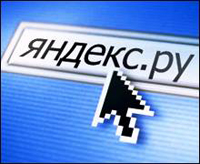Russia to launch Cyrillic domains next year
Following ICANN's (Internet Corporation for Assigned Names and Numbers) announcement of a radical shake-up of the Internet last week, Russia will create its first Internet addresses using the Cyrillic alphabet next year, Communications Ministry Official Vladimir Vassiliev said.

At present, Russia uses only two top-level domain names; .ru and .su. The country will be able to create a third one in Cyrillic by the second quarter of next year, as per Vassiliev.
Read also : Most expensive domain names
Many Russians are unable to surf the Web using Latin alphabets; the ability to surf the Web entirely in Russian would mean a jump in number of Internet users; in Vassiliev's opinion. The ministry wants to see the number of Internet users climb from 35 million at the end of last year to nearly 46 million by the end of this year.
Besides, Russian President Dmitry Medvedev had, at the beginning of this month, stressed on the importance of Russia having domain names in Cyrillic, mainly to reinforce the role of the Russian language in the world.
Read also: Top 10 oldest domains on the Internet
Meanwhile, ICANN, at the top-level meeting held in Paris last week, unanimously voted in favor of relaxing the strict rules around the so-called top-level domain names. The Internet regulator also approved a second proposal towards introducing domain names written in scripts in Asian and Arabic languages, techtree.com reports.
Director of the Coordination Center for TLD RU, Andrey Romanov, said people often carry out internet searches after they've seen billboard ads or heard something on the radio.
“Problems arise when trying to figure out how to translate something from one’s native language into a Latin URL that has been assigned to a particular company or concept,” Romanov said.
Some Internet users question why Cyrillic domain names are needed. Most computer users have some knowledge of the Latin alphabet, and there is scepticims that script-specific addresses would offer anything new.
General Director of Begun in Moscow, Aleksey Basov, says Cyrillic domains are attractive to people who want to penetrate potential markets.
“Cyrillic domains reflect recent trends which attempt to reach out to parts of the population that are not comfortable using the English-language international standard,” Basov said.
That's already happening with the Russification of computer software and games. Technology is not always driven by things we need, rather by finding out what we can do - and revealing new capabilities, Russia Today reports.
Subscribe to Pravda.Ru Telegram channel, Facebook, RSS!





